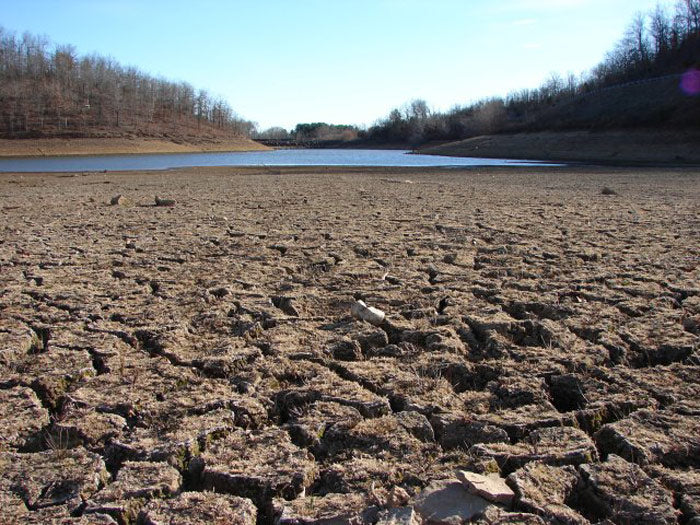
Climate Change Predictions Would Pose a Water Scarcity Risk to More than 600 Million People
By Dan DeBaunShare
According to a study published recently in the journal Environmental Research Letters, climate change predictions, which are anticipated to set mean global temperature increase at around 3.5 degrees Celsius higher than pre-industrial temperatures, will pose a risk of new water scarcity or aggravate existing water scarcity issues for 668 million people around the world. The study reveals that the number of people living in water-scarce river basins will increase by 11% from the number in 2000, and that those that are already residing in water-scarce regions, the effects on water scarcity will be aggravated further.
Results from the research show that populations who will experience the most drastic changes and be most affected include those living in Southwest US, Southern Europe, Middle East and North Africa. The study further illustrates that should global mean temperatures increase by the internationally agreed target of 2°C, 486 million people (8% of the global population) will face new or aggravated water scarcity, particularly in North East Africa and the Middle East regions.
“Our global assessments suggest that many regions will have less water available per person”, explains lead author, Dr Dieter Gerten, from the Potsdam Institute for Climate Impact Research. “Even if the increase is restricted to 2°C above pre-industrial levels, many regions will have to adapt their water management and demand to a lower supply, especially since the population is expected to grow significantly in many of these regions.”
“The unequal spatial pattern of exposure to climate change impacts sheds interesting light on the responsibility of high-emission countries and could have a bearing on both mitigation and adaption burden sharing”, said Dr Gerten.
Declining precipitation is the primary driver behind new or aggravated water scarcity, but this will be further exacerbated by higher temperatures which will result in increased evapotranspiration of water, and consequently, reduced water resources.
As the global population is anticipated to increase, so too will the demand for water, putting even greater pressure on water resources and the availability of these resources in vulnerable regions.
The research team assessed the impact of a variety of different global warming scenarios, by combining existing simulations from nineteen climate change models with eight different global warming levels ranging from a 1.5°C to a 5°C increase above pre-industrial temperatures. Overall, 152 different climate change scenarios were analyzed.
In addition to water scarcity, the scientists also examined the impact that future climate change would have on terrestrial ecosystems around the world, in an effort to assess which regions will be most affected by radical ecosystem changes, and whether any of the areas most likely to be affected are biodiversity hotspots or rich in endemic species.
According to Dr Gerten: “At a global warming of 2°C, notable ecosystem restructuring is likely for regions such as the tundra and some semi-arid regions. At global warming levels beyond 3°C, the area affected by significant ecosystem transformation would significantly increase and encroach into biodiversity-rich regions. Beyond a mean global warming of 4°C, we show with high confidence that biodiversity hotspots such as parts of the Amazon will be affected.”
Journal Reference
Dieter Gerten, Wolfgang Lucht, Sebastian Ostberg, Jens Heinke, Martin Kowarsch, Holger Kreft, Zbigniew W Kundzewicz, Johann Rastgooy, Rachel Warren, Hans Joachim Schellnhuber. Asynchronous exposure to global warming: freshwater resources and terrestrial ecosystems. Environmental Research Letters, 2013; 8 (3): 034032 DOI: 10.1088/1748-9326/8/3/034032
-
Regular price $234.00 USDRegular priceUnit price / per
-
Regular price $327.00 USDRegular priceUnit price / per
-
Regular price From $367.00 USDRegular priceUnit price / per
-
Regular price From $408.00 USDRegular priceUnit price / per
-
Regular price From $451.00 USDRegular priceUnit price / per
-
Regular price From $478.00 USDRegular priceUnit price / per
-
Regular price $332.50 USDRegular priceUnit price / per
$350.00 USDSale price $332.50 USDSale

Dan DeBaun
Dan DeBaun is the owner and operator of Big Berkey Water Filters. Prior to Berkey, Dan was an asset manager for a major telecommunications company. He graduated from Rutgers with an undergraduate degree in industrial engineering, followed by an MBA in finance from Rutgers as well. Dan enjoys biohacking, exercising, meditation, beach life, and spending time with family and friends.
~ The Owner of Big Berkey Water Filters
















